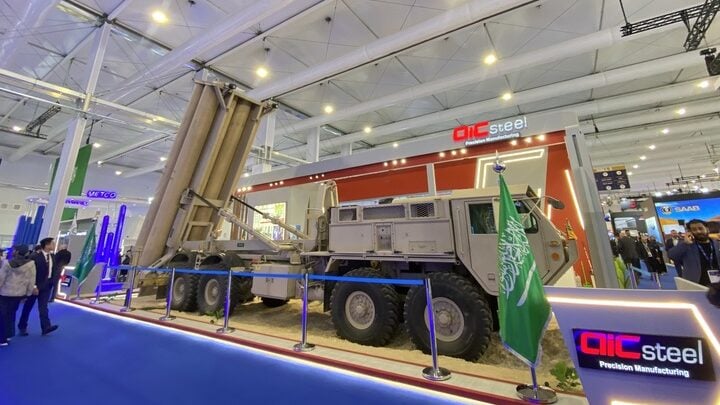Saudi Arabia to manufacture parts of Lockheed missile defence system PHOTO
U.S. weapons maker Lockheed Martin has signed agreements for Saudi Arabian companies to manufacture parts of its missile defence system, as the U.S. continues to conduct military operations in the Middle East against Iran-backed groups.
The sub-contracts for the Terminal High Altitude Area Defense (THAAD) system will enhance manufacturing capabilities in Saudi Arabia and transfer expertise to strengthen the country’s defence industry, Lockheed said in a statement on February 5, Reuters reports.
The deal was announced on the sidelines of the World Defense Show in the capital Riyadh.
State-owned Saudi Arabian Military Industries (SAMI) signed 11 agreements at the event, according to the country's state news agency.
The contracts come at a time of rising tension in the region.
The United States and Britain unleashed attacks against 36 Houthi targets in Yemen on Saturday, a day after the U.S. military hit Tehran-backed groups in Iraq and Syria in retaliation for a deadly attack on U.S. troops in Jordan.
Some shipping companies have suspended transit along the busy Red Sea route to avoid being attacked by Yemen's Iran-backed Houthi group, which has launched waves of exploding drones and missiles at vessels since November in response to Israel's military operations in Gaza.

The Biden administration has maintained backing for the Saudis to receive the THAAD system first approved in 2017 to counter ballistic missile threats.
The prime partners of Lockheed Martin's deal that will receive sub-contracts include Middle East Propulsion Company (MEPC) and Arabian International Company (AIC) for Steel.
Airbus also said on February 5 it was in talks with existing operators of its A330 tanker military planes, including Saudi Arabia, for more orders.
In a separate deal, Boeing Saudi Arabia and Bahri Logistics, a unit of the country's national shipping company, signed an MoU that envisages boosting supply chain activities in the country and enhancing Bahri's support for services and defence-related products.
Former foes
Qatar's Barzan Holdings also said on February 5 that it had signed a preliminary agreement with SAMI in what it dubbed the first such deal between defence companies in the Gulf.
"We would like to explore some quick wins with them and think about longer-term opportunities as well," CEO Abdullah al-Khater told Reuters, without specifying the nature of projects.
The defence cooperation comes almost three years after Saudi Arabia and Qatar restored ties.
Riyadh and Doha had been locked since 2017 in a bitter rivalry over regional influence, the role of Islam in politics, and support for pro-democracy movements across the Middle East.
In 2017, Saudi Arabia, the UAE, Bahrain and Egypt severed all ties with Qatar over accusations that it supported terrorism and had forged closer ties with Iran. Doha denied the charges.
"That was in the past," Khater said when asked about the dispute.
"We always think about what is the future, what we can do together, when both leaderships agree to resume the natural relationship we always had."








